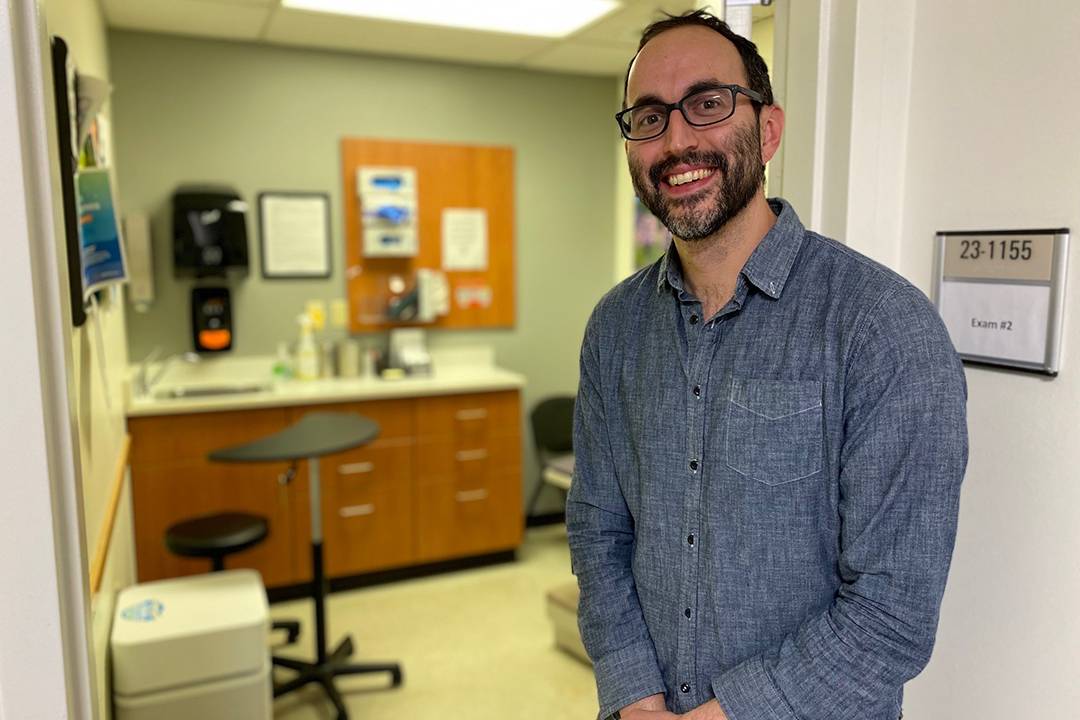Exploring the impact of the COVID-19 pandemic on healthcare workers
Anthony Jimenez interviews local healthcare workers to uncover the multifaceted impacts of the global pandemic
Provided photo
Anthony Jimenez, associate professor, is currently interviewing regional healthcare workers to explore the struggles they face as a result of the COVID-19 pandemic.
The impact of the COVID-19 pandemic has extended through nearly all facets of society and everyday life since March 2020. In the summer of 2022, Anthony Jimenez, assistant professor in RIT’s Department of Sociology and Anthropology and trained medical sociologist, began to explore the specific impacts faced by regional healthcare practitioners. Thus far, despite initial assumptions, his findings have centered less on personal struggles and more on the impact of systemic failings.
Jimenez’s research, “Healthcare Provision Amidst COVID-19 in Rochester, NY,” analyzes the lived experiences of regional healthcare workers with a particular focus on practitioners in the healthcare safety net, which provides services to marginalized populations with the least stable funding sources. By collecting interviews from practitioners, he is able to capture first-person accounts of what doctors, nurses, home healthcare providers, and other medical staff have faced throughout the ongoing pandemic.
“Much of my work has previously focused on health disparities, particularly among undocumented immigrants. I try to do research that examines the experience of health disparities for marginalized individuals along various axes of power like race, gender, class, and legal status,” said Jimenez. “This project is an extension of that work and sort of a stepping stone toward what I hope to be my next project, which looks at the impact of the pandemic on patients.”
While he initially set out to uncover the personal impact on these practitioners’ health and well-being, Jimenez felt that he needed to delve deeper into a thread of shared complaints once he began the interview process.
“What healthcare practitioners want to talk about the most, it seems, are their critiques of the healthcare system. That’s when they get fired up and they get particularly passionate and eager to share their thoughts. So now I’m really looking at the questions of what thoughts do they have about the healthcare system, how they would change it, and what are their critiques,” said Jimenez. “If we are to envision and create some sort of alternative, who better to articulate what is needed than the health practitioners that are doing this on the ground work day in and day out.”
While the research is still underway, Jimenez shared two preliminary, interrelated struggles that most of his interview subjects have expressed: the sentiment of not feeling supported, and the struggle with moral injury in the workplace.
According to Jimenez, several of his interview subjects have shared that they are starving for human support due to staffing shortages and having to treat the same amount of patients, or more, with fewer staff members. As a result, staff are often emotionally and physically strained and pushed to their limits, which makes the concept of moral injury even more unmanageable.
“An example of a moral injury is when a practitioner wants to do what is good, but they’re unable to do so for any number of reasons, often because of bureaucracy or policy. From what I’ve heard from the practitioners that I’ve talked to thus far, this sense of moral injury is increasing more and more because, as a system, the healthcare safety net and other health providers are being strained for resources and support—and these issues were exasperated due to the pandemic. They’ve taken a vow to do no harm, but it’s increasingly difficult to do any good.”
Jimenez will continue interviewing regional healthcare practitioners throughout 2023 and plans to publish his findings later this year. He expressed that he hopes the first-person accounts gathered through this research will spark change both in policy and in public sentiment toward healthcare workers.
“I would like to see a social and cultural recognition among everyday folks of this work and why it's important. In my mind, that’s how we begin to collectively, on a societal level, envision what change looks like,” said Jimenez. “Change is possible, but it requires creativity, imagination, and courage, all of which we are all capable of.”
Jimenez is actively recruiting health practitioners from the Rochester region who are interested in sharing their stories for the project. Those interested are invited to contact him at amjgss@rit.edu or 585-475-4768.




